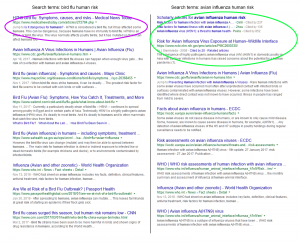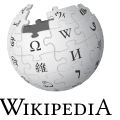3 Background Reading
As you are exploring your topic and figuring out ways to narrow it down to a searchable question, it is a good idea to do some initial reading. For one thing, you might not know much about your topic yet. For another, such reading will help you learn the terms used by professionals and scholars who have studied your narrower topic. Those terms might become your keywords or search terms later on, so keep them in mind.
Getting Your Words Right
It’s important to understand that the search terms you use will have a direct correlation with the kinds of sources you find. And spending some time early on in your research learning relevant terms will save you time later on.
For instance, if you were going to do research about the risk of bird flu to humans, initial background reading would teach you that professionals and scholars usually use the term avian influenza instead of bird flu when they write about it. (Often, they also use H1N1 or H1N9 to identify the strain.) If you didn’t learn that, you would miss the kinds of sources you will eventually need for your assignment.
Take a look at the Google search results using the terms “bird flu” and human risk vs. “avian influenza” and human risk. Compare the kinds of sources listed.
(Click on the thumbnail image for a larger view. Use your browser’s back-button to return to the page.)

If you were to follow the linked results, you would see that the sources on the right come from government agencies and scientific journals, whereas the sources on the left come from news outlets or consumer health websites.

A Note About Wikipedia
Wikipedia is a popular place to start your research and will likely be one of the top results in a Google search of your topic. While Wikipedia articles are edited and must be supported with external links and references to other, legitimate sources, it is not a good idea to rely solely on them. That’s because you can’t verify who has written the article, and whether the author has any credibility or expertise on the subject. Content on Wikipedia has the potential to change quickly, so your source might disappear and will be difficult for your reader to find later.
What you can do with a Wikipedia article is look at the external links, the references, and the suggestions for further reading and try to follow up with those, either in the Library’s collection or elsewhere on the internet.

